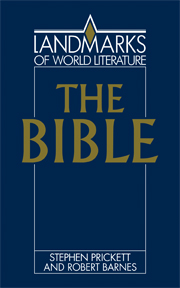1 - Introduction
Published online by Cambridge University Press: 19 January 2010
Summary
The book
The world's largest theological libraries, such as the Andover-Harvard Theological Library and the Union Theological Seminary Library in New York, contain hundreds of thousands of works devoted in one way or another to the Bible and its contents. One can only guess, from publishers' catalogues and circulars, at the rate at which these collections must be growing in size every year. Publication mega-statistics are, of course, no final guide to a book's importance — during the Cultural Revolution in China The Thoughts of Chairman Mao, we are told, was distributed in such quantities as to make it the world's number one bestseller — but they do serve to highlight the scale of the present book in relation to its subject. The Bible is, simply in cultural terms, the most important single book in the history of Western civilization, if not of the world.
Our word ‘Bible’ is derived, via the French bible, from the late Latin biblia, a feminine singular noun meaning simply ‘the (single) book’. In earlier Latin, however, biblia was not taken to be the feminine singular, but the neuter plural form, which, following the Greek, ta biblia, meant ‘the (individual) books’. It was originally in fact no more than a physical description of the form in which the biblical texts were commonly held, before the invention of the codex: a collection of separate scrolls which would be stored in a wooden chest or cupboard.
- Type
- Chapter
- Information
- The Bible , pp. 1 - 17Publisher: Cambridge University PressPrint publication year: 1991
- 1
- Cited by



